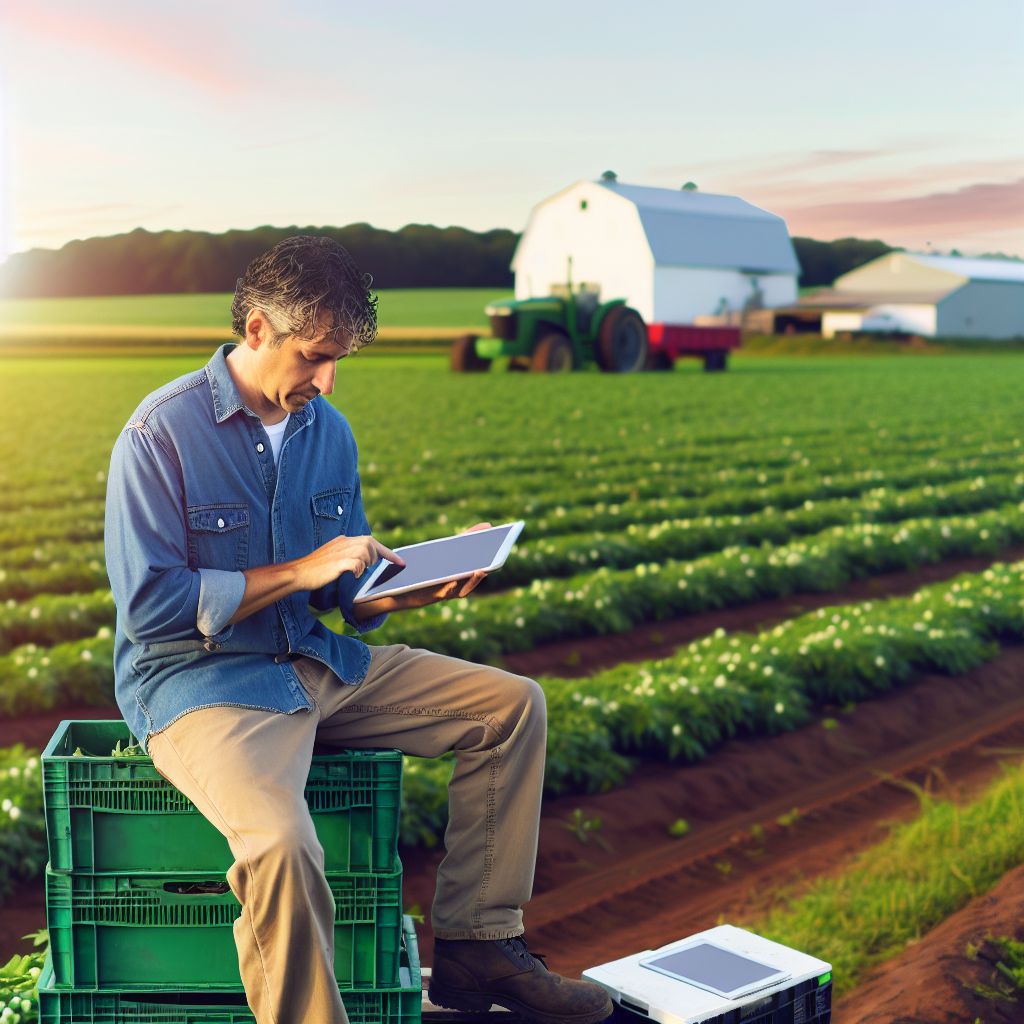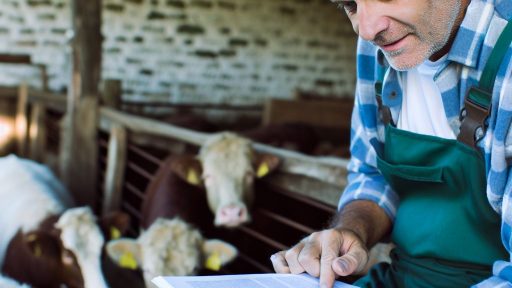Overview of Organic Certification Requirements
Organic certification entails rigorous standards and practices.
These standards guarantee that agricultural products are environmentally friendly.
Farmers must follow specific guidelines to label their products as organic.
Documentation and audits are essential parts of the certification process.
Requirements for Certification
The USDA outlines comprehensive requirements for organic certification.
Inspectors evaluate farming practices, inputs, and crop management.
Prohibited substances, such as synthetic fertilizers, are closely monitored.
Additionally, farmers must keep detailed records of all substances used.
Benefits of Organic Certification
Achieving organic certification offers significant market advantages.
Consumers increasingly prioritize organic products for health reasons.
This preference enhances the visibility and sales of certified products.
Furthermore, organic farming promotes environmental sustainability.
The Importance of Traceability
Traceability is a crucial element of organic certification.
It ensures the integrity and safety of organic products.
Companies must establish clear supply chain visibility.
Transform Your Agribusiness
Unlock your farm's potential with expert advice tailored to your needs. Get actionable steps that drive real results.
Get StartedTraceability allows consumers to verify organic claims confidently.
Implementing Traceability Protocols
To meet certification standards, protocols must be implemented effectively.
Choosing appropriate technology can enhance traceability efforts.
Barcoding and blockchain are cutting-edge solutions for tracking.
Regular training ensures that all staff understand new systems.
Challenges in Maintaining Traceability
Maintaining traceability can pose various challenges for producers.
Inconsistent record-keeping practices may create gaps in information.
Additionally, navigating complex supply chains requires diligence.
Collaborating with suppliers is essential for successful traceability.
Key Components of Traceability Protocols in Organic Farming
Introduction to Traceability
Traceability in organic farming ensures product integrity from farm to table.
It involves recording the journey of organic products through the supply chain.
This system enhances transparency and builds consumer trust.
Data Collection Methods
Effective traceability begins with accurate data collection.
Farmers should keep detailed records of planting, harvesting, and processing.
Additionally, companies must log transportation and storage conditions.
Implementing digital tools simplifies data management significantly.
Labeling Standards
Proper labeling is essential for traceability in organic farming.
Labels should clearly indicate the source and production methods.
Regulatory bodies often have strict requirements for organic labels.
Farmers and distributors must stay informed about these regulations.
Tracking Technology
Utilizing technology can greatly enhance traceability efforts.
Barcodes and QR codes facilitate easy access to product histories.
Blockchain technology offers a secure and transparent tracing system.
These technologies help confirm product authenticity and origins.
Showcase Your Farming Business
Publish your professional farming services profile on our blog for a one-time fee of $200 and reach a dedicated audience of farmers and agribusiness owners.
Publish Your ProfileCollaboration Across the Supply Chain
Collaboration is critical for successful traceability protocols.
All stakeholders, from farmers to retailers, must work together.
Sharing information fosters accountability and strengthens the system.
Frequent communication can resolve issues quickly and effectively.
Continuous Improvement
Establishing traceability protocols is an ongoing process.
Regular audits and evaluations help improve these systems.
Incorporating feedback from all parties leads to better practices.
Continual education on new regulations keeps all participants informed.
Technological Solutions for Implementing Traceability in Agricultural Supply Chains
Introduction to Traceability
Traceability plays a critical role in agricultural supply chains.
It ensures that products meet organic certification standards.
Incorporating technology can greatly enhance traceability efforts.
Blockchain Technology
Blockchain offers a transparent and secure method for tracking products.
This technology records every transaction in an immutable ledger.
As a result, it prevents tampering and fraud in the supply chain.
Moreover, stakeholders can access real-time data on product origins.
RFID and Barcode Systems
Radio-frequency identification (RFID) tags are effective for traceability.
They allow for easy and automated tracking of products through the supply chain.
Similarly, barcode systems provide a cost-effective localization method.
These scanning systems facilitate quick data input and retrieval.
IoT Devices for Monitoring
Internet of Things (IoT) devices can monitor environmental conditions.
They track temperature and humidity during transport and storage.
This real-time data helps maintain product quality and safety.
Additionally, IoT can enhance transparency throughout the supply chain.
Software Solutions for Management
Supply chain management software streamlines traceability processes.
These platforms enable efficient data collection and analysis.
They often include features like reporting tools and dashboards.
As a result, businesses can make informed decisions based on data insights.
Case Studies of Implementation
Successful examples illustrate effective traceability practices.
For instance, GreenField Farms utilizes blockchain for organic vegetable tracking.
This method has significantly reduced food safety incidents.
Similarly, FreshTrack employs RFID technology to manage fruit shipments efficiently.
This has improved their inventory accuracy and customer satisfaction.
Challenges and Solutions
Implementing traceability can pose challenges for many companies.
Resistance to change is a common barrier in the industry.
Training programs can help ease this transition for employees.
Furthermore, integrating diverse systems can be complex.
Utilizing standardized platforms can simplify data synchronization.
The Future of Traceability in Agriculture
Traceability technologies will continue to evolve in agriculture.
Innovation will lead to more robust and reliable solutions.
As regulations tighten, farm-to-fork accountability will become paramount.
Showcase Your Farming Business
Publish your professional farming services profile on our blog for a one-time fee of $200 and reach a dedicated audience of farmers and agribusiness owners.
Publish Your ProfileUltimately, technology will play a vital role in ensuring compliance.
Delve into the Subject: Sustainable Livestock Production Methods for Climate-Resilient Farming
Steps for Developing a Comprehensive Traceability Plan for Organic Products
Establish Clear Objectives
Clearly define the goals of your traceability plan.
Ensure that these objectives align with organic certification requirements.
Furthermore, consider the specific needs of your supply chain partners.
Identify Key Stakeholders
List all parties involved in the production and distribution of organic products.
Engage farmers, suppliers, processors, and retailers in the planning process.
Additionally, maintain open lines of communication with certification bodies.
Map the Supply Chain
Create a detailed map of your product’s journey from farm to table.
Include every stage, from cultivation to processing and distribution.
This visibility will help clarify potential risks and bottlenecks.
Select Appropriate Technology
Choose technology suited for tracking organic products effectively.
Consider using barcode systems or blockchain for improved transparency.
Moreover, ensure the system you choose integrates easily with existing operations.
Develop Data Collection Protocols
Establish standards for data collection at every stage of the supply chain.
Use consistent formats for recording essential information.
Additionally, prioritize timely data entry to maintain accuracy.
Implement Training Programs
Provide training for employees on traceability procedures.
Make sure everyone understands the importance of accurate tracking.
Furthermore, offer refresher courses to keep staff updated on best practices.
Test and Validate the System
Conduct trials to ensure the traceability system functions as intended.
Identify and correct any issues before full implementation.
Additionally, solicit feedback from stakeholders to enhance the system.
Monitor and Improve the Process
Regularly assess the performance of your traceability plan.
Collect data to identify areas for improvement over time.
Moreover, remain adaptable to changes in regulations or market conditions.
Find Out More: Sustainable Farm Certification for Organic Crop and Livestock Production
Best Practices for Documenting and Tracking Organic Inputs and Outputs
Establishing Clear Documentation Processes
Effective documentation is crucial for traceability.
Begin by creating a standardized template for records.
This template should encompass all organic inputs and outputs.
Include details such as dates, quantities, and suppliers.
Clearly label each document for easy retrieval and reference.
Utilizing Technology for Enhanced Tracking
Embrace digital tools to streamline your documentation process.
Consider using software specifically designed for agricultural traceability.
This software can automate data entry and enhance accuracy.
Incorporate barcoding or RFID systems for efficient tracking.
These technologies can significantly reduce human error.
Training Staff on Best Practices
Educate your team on the importance of accurate record-keeping.
Host regular training sessions to reinforce best practices.
Provide hands-on demonstrations of tracking systems.
Showcase Your Farming Business
Publish your professional farming services profile on our blog for a one-time fee of $200 and reach a dedicated audience of farmers and agribusiness owners.
Publish Your ProfileEncourage staff to ask questions about the documentation process.
Conducting Regular Audits
Set a schedule for conducting audits of your traceability systems.
Regular audits help identify gaps in your documentation process.
Use these audits to provide feedback and improve practices.
Document the findings to ensure continuous improvement.
Maintaining Compliance with Certification Standards
Familiarize yourself with the specific requirements for organic certification.
Your documentation must align with these standards to ensure compliance.
Stay updated on any changes to organic certification regulations.
Collaborate with certification bodies for guidance and support.
Engaging with Suppliers and Customers
Communicate your traceability procedures with suppliers and customers.
Ensure that they understand the importance of compliance.
Encourage suppliers to provide detailed documentation of their inputs.
Share your traceability successes to build trust with customers.
Find Out More: Sustainable Farm Certification for Regenerative and Carbon Farming

Challenges and Solutions in Maintaining Traceability for Organic Certification
Understanding Traceability Requirements
Traceability is crucial for organic certification compliance.
It ensures transparency throughout the supply chain.
Organic standards require detailed documentation.
Each product must have a verified history from farm to consumer.
Identifying Key Challenges
Many farms lack the infrastructure for effective traceability.
Inconsistent record-keeping practices often complicate verification.
Furthermore, limited access to technology poses a significant barrier.
These issues can result in non-compliance with certification standards.
Implementing Effective Solutions
Investing in technology can enhance traceability efforts.
Software systems can automate record-keeping processes.
Additionally, training staff on traceability protocols is essential.
This ensures employees understand their role in the process.
Utilizing Blockchain Technology
Blockchain technology offers a promising solution for transparency.
It provides a secure, immutable record of transactions.
With blockchain, every step of the supply chain becomes verifiable.
This fosters trust between producers and consumers.
Promoting Collaboration Among Stakeholders
Collaboration between farms, suppliers, and certifying bodies is vital.
Regular communication can help address traceability challenges.
Establishing partnerships encourages sharing best practices.
This leads to improved compliance and mutual support.
Future Perspectives on Traceability
Maintaining traceability will become increasingly important.
Consumer demand for transparency continues to rise.
Thus, adapting to these requirements will benefit the entire organic industry.
Discover More: Organic Poultry Farming for Sustainable and Ethical Egg Production
Case Studies Demonstrating Successful Traceability Implementation in Organic Farms
Green Valley Farms: A Model of Transparency
Green Valley Farms successfully implemented a traceability system in 2021.
This initiative improved transparency and customer trust significantly.
Showcase Your Farming Business
Publish your professional farming services profile on our blog for a one-time fee of $200 and reach a dedicated audience of farmers and agribusiness owners.
Publish Your ProfileThey adopted blockchain technology to track product movements.
As a result, consumers access real-time data about their food sources.
This approach enhanced product authenticity and reduced fraud incidents.
Agricultural Innovations: Enhancing Safety and Quality
Agricultural Innovations launched a traceability program in 2020.
This program focused on seed-to-shelf tracking for organic produce.
The system uses QR codes for easy access to product information.
Consumers scan the codes to learn about farming practices.
This transparency has fostered customer loyalty and sales growth.
Sustainable Harvest: Leveraging Technology for Accountability
Sustainable Harvest introduced an integrated tracking system in 2019.
This system utilizes GPS technology to monitor field activities.
It documents every step of the production process meticulously.
The detailed records facilitate compliance with organic standards.
Farmers report a higher efficiency in managing their crops.
Riverside Organics: Collaborating for Better Practices
Riverside Organics collaborated with local tech startups for traceability.
This partnership developed an app for farmers to log their inputs.
Farmers can also report any incidents impacting their crops.
This solution provides critical data to ensure organic compliance.
The app has made the farming process more transparent and accountable.
Future Trends in Traceability for Organic Agriculture
Technological Advancements
Technological advancements drive the future of organic traceability.
Blockchain technology offers unparalleled security and transparency.
This innovation allows stakeholders to trace organic products from farm to table.
Additionally, IoT devices enhance real-time tracking of agricultural practices.
As a result, farmers can monitor conditions and compliance more efficiently.
Consumer Demand for Transparency
Consumers increasingly demand transparency in food sourcing.
They seek detailed information about organic produce origins.
This trend pushes producers to enhance their traceability measures.
Transparency fosters trust and promotes loyalty among consumers.
Furthermore, businesses that prioritize traceability can gain a competitive edge.
Integration with Regulatory Standards
Regulatory bodies will likely evolve their standards for traceability.
Future regulations may require comprehensive documentation of the supply chain.
Compliance will involve detailed reporting of production methods and inputs.
Consequently, companies must invest in effective traceability systems.
Potential Regulatory Changes
Stringent Certification Processes
Regulatory agencies may implement stricter certification processes.
These processes will likely demand enhanced record-keeping practices.
Producers must be prepared for comprehensive audits and inspections.
Ultimately, these changes aim to uphold organic integrity in the market.
Increased Focus on Sustainability
Future regulations will emphasize sustainability alongside traceability.
Companies will need to demonstrate eco-friendly practices and impacts.
This aligns with growing public interest in environmentally conscious farming.
As a result, sustainable methods will become pivotal for organic certification.
Showcase Your Farming Business
Publish your professional farming services profile on our blog for a one-time fee of $200 and reach a dedicated audience of farmers and agribusiness owners.
Publish Your ProfileCollaboration Across the Supply Chain
Regulatory changes will encourage collaboration within the supply chain.
Stakeholders must work together to enhance traceability protocols.
Collaboration will streamline compliance with emerging regulations.
In addition, partnerships can aid in addressing traceability challenges.
Overall, cooperation will strengthen the organic agriculture sector.
Additional Resources
C.A.F.E. Practices: Starbucks Approach to Ethically Sourcing Coffee …




